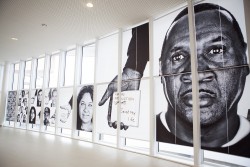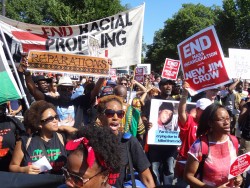“Justice dies when dehumanized, no matter how exactly it may be exercised.”
—Rabbi Abraham Joshua Heschel
A Story

Several years ago, an elderly black man was seated at the table inside his tiny studio apartment in Denver, Colorado, alongside his brother and two old friends. Suddenly, the window shattered from the blow of a billy club, while the front door was simultaneously ripped from its hinges. A flash grenade shot through the window, disorienting the men, as a voice commanded, “Get down on the ground!” Bewildered, the four men fell prostrate to the floor.
A second flash grenade rolled into the apartment, stopping between the legs of the first man and searing a second-degree burn the size of a football onto his thighs. He moaned in pain as dozens of SWAT team agents rushed in, stomping on the men as they entered, toting assault rifles and shotguns as they spewed curses. After ransacking the apartment’s meager belongings, having physically and emotionally brutalized its occupants, the lead agent reported into his walkie-talkie, “We’ve got nothing.”
It was later revealed the FBI had been searching for a neighborhood drug kingpin. What they found were a few old men playing cards. They had targeted the wrong home. After realizing their mistake, the agents called an ambulance and then left. Behind them was a scene they considered “collateral damage” in the “war on drugs”: an apartment sprawled with shattered glass, burned carpets, broken tables, no front window or door, and four traumatized men robbed of their dignity.
 The next day, the tenant’s son called the police department demanding compensation for the damages; the landlord had refused to fix the apartment despite the approaching frigid Colorado winter. The officer said there was nothing they could do. The son asked, “Are you telling me that had this happened in Cherry Hills,” (a wealthy Denver suburb) “you would not cover the damages?” The policeman insisted that it would be no different. “That’s a lie,” said the son, “You know the only way you could get away with this is because it was four black men.” The son hung up the phone feeling an unsettling sense of resignation.
The next day, the tenant’s son called the police department demanding compensation for the damages; the landlord had refused to fix the apartment despite the approaching frigid Colorado winter. The officer said there was nothing they could do. The son asked, “Are you telling me that had this happened in Cherry Hills,” (a wealthy Denver suburb) “you would not cover the damages?” The policeman insisted that it would be no different. “That’s a lie,” said the son, “You know the only way you could get away with this is because it was four black men.” The son hung up the phone feeling an unsettling sense of resignation.
I am the son.
The man whose legs are severely and permanently burned is my father.
This incident, which happened in 2009, marked the first time I ever viewed my heroin-addicted father – whose drug dependence had removed him almost entirely from my life – as a victim more than a criminal.
The chaos of that encounter, in addition to a lifetime of my own subjection to suspected criminal activity (“randomly” being pulled over while driving, or stopped while walking in “good” neighborhoods) because of the color of my skin, inspired my inquest of the drug war.
I have sought to understand its effects on the lives of the men in that room, especially my father, and by extension black and brown people in these United States of America. Our government’s “war on drugs” has effectively criminalized instead of medicalized their addictions. My experience has introduced me to a massive narrative of criminal injustice housed in multilayered systems infinitely more complex than I ever imagined possible in a “progressive” society.
A Virtue Theoretic Approach
“Jesus didn’t forgive his executioners on principle but because in some unimaginable way he was able to love them.”
—Frederick Buechner
The entire so-called “justice system” in the United States, as protestors all over the country repeatedly testify, is “guilty as hell.” If this is so, what, in fact, are the charges of the people against this system now on trial?
It is guilty of repeating the injustices applied to the men above thousands upon thousands of times. The system is guilty of having two forms of “justice,” depending on whether one is white or not. The system is guilty of using the “war on drugs” as a pretext for waging a war on black and brown families in urban communities. The system is guilty of commodifying black bodies and poor bodies through the now-multi-billion-dollar industries of mass incarceration and policing for profit.
The pervasive culpability of the whole system is why the movement for the liberation of black lives must not be content with reforming parts of our current system; rather, it must seek to reimagine a new one altogether. Reimagining a system as extensive and entrenched as the U.S. justice system — visioning a new system that recognizes and validates the human potential of people and populations labeled as criminal — is indeed a tall task, one too lofty for the scope of this essay. What this essay will explore, though, is one particular ethical lynchpin of the current system that must be challenged if we are ever to truly imagine and build a more just, restorative alternative.
All legal systems are built on some kind of ethical framework — a shared collection of values and norms that serve as the basis of what is deemed right or wrong in the courts; but here I argue that there are certain ethical frameworks that provide more of the necessary conditions for respecting the humanity of all people, particularly those people most violated by the current system. In other words, this essay will explore if it can be said that certain ethical foundations (like deontology) hinder legal justice while others (like virtue ethics) promote it. Are certain systems of ethics, by nature, more compatible with humanization efforts in law and justice than others?
Two primary ethical theories — virtue ethics and deontology — both attempt to tell us how we ought to live. On the one hand, virtue ethics describes a moral action by what a virtuous person, for instance Jesus, would do. Deontology, in contrast, defines morality by adherence to a set of universal principles, such as the Ten Commandments.
Like virtually all post-Enlightenment civilizations, the United States of America claims to be a deontological (or rule-based) society that is founded on the law of the constitution. So the patriotic narrative goes that the U.S. was founded on the democratic idea of setting ideal principles (the constitution) above oppressive rulers like those of Great Britain.
Much can be said about if the U.S. is in fact a “rule-based” society, or if it is more accurate, as I believe, to describe this nation as a race-based society, given the American experiment has always been facilitated by a racial undercaste. It is sufficient to say here, though, that the U.S. has gone to great lengths to at least present itself as a “rule-based” society in which the character of her citizens is judged by following established sets of rules and codes. People who follow the law are generally deemed good people and people who do not are deemed bad people.
Little is mentioned, except lately in some contexts as a result of social upheaval sparked by brave organizers and disenfranchised communities, about whether these laws are actually fair; even less, still, about whether good people can break the law and bad people, whether through Wall Street loopholes or sheer determination, can keep the law. Under deontology, as demonstrated by our punitive penal system, developing the character of the individual matters not. It is only the actions of the individual, namely that the individual refrains from breaking a law, that is of concern.
But if we are going to create a society whose institutions correspond to titles like “correctional” or “rehabilitation,” which many of our incarceration programs bear now only in title, then the character of individuals must be of utmost concern. Take, for instance, a child who violates a rule of her parents’ household, such as lying to her parents. Under a deontological household, the child would likely be disciplined for such an action and possibly removed from her community with little deliberation about why truth-telling is important; there would be little creative effort to shape a more honest child.
Virtue ethics, contrarily, born in a Greek context that celebrated padeia – thorough moral and intellectual transformation through the undergoing of rigorous education – asserts that the right kind of actions emanate naturally from becoming the right type of person. Adherents of the Greek tradition of virtue ethics – philosophers such as Aristotle, and later followers such as Thomas Aquinas – understood that virtuous people were not born but groomed by the scalpels of time, by the pursuit of learning, and, most of all, by wise instruction.
Thus the distinction between these two systems begins with their different starting points. Whereas deontology is a top-down approach beginning with rules and working down towards people, virtue ethics is a bottom-up approach beginning with flawed people and moving toward the ideal person. It is precisely this contrasting understanding of what the movement towards virtue is and which direction it flows that makes virtue ethics more socially sympathetic. Indeed, the movement from flawed person to ideal person is more humane than the opposite move from inanimate standard to flawed person, because it is situated in human experience the entire time.
To exemplify the benefits of virtue ethics, let us return to the previous example of the child. The issue of lying centers on the virtue of honesty and the vice of deception. By lying, the child is choosing to deceive. The child could likewise choose the virtuous option of truth-telling. An individual cannot simply be granted an honest character though always telling the truth and never deceiving the parents. Such focus is on the action itself, thus it falls under deontology. Attention for the virtue ethicist centers on whether or not the individual believes bearing truthfulness as a conviction. That is, a person’s actions of honesty correspond to (1) a deeply rooted belief that honesty and truth are inherently good and (2) a respect for the persons and situation which garner that truth be told. These virtues, when embodied, lead to a flourishing society, what Aristotle calls eudaimonia.
This issue culminates in a way most relevant to mass incarceration when one considers if the standard for measuring virtue should be laws or a certain type of person. A duty-based fixation on rules exaggerates the moral difference between “law-abider” and “law-breaker,” “felon” and “citizen,” in ways that unavoidably carry ontological judgments that provide impetus for casting away criminals. Virtue theory, however, by setting the standard as the ideal person, allows for a more intricate moral dialogue and pedagogy that moves beyond simplistic categorizations of right or wrong into the complex realm of degrees of goodness and badness.
Because this enfleshed standard reduces the perceived distinction between law abiders and transgressors, the human potential of all becomes more apparent. It can be seen that everyone is capable of a kind of horror punishable by law and a kind of beauty rewarded by God. The line separating “us” – the good people, who do right – and “them” who do wrong blurs when people see morality as more than the fulfillment of legal duty. For the seemingly immoral and moral person alike, character development toward the ideal human being becomes paramount to the comfort of one’s own moral status. We all, with humility, strive toward becoming our best selves no matter our current condition.
 Another question that must be answered is: What supportive mechanisms, if any, do people need to become virtuous? It is the sink or swim propensity of deontological theory – to erect moral standards, provide few support mechanisms to help people achieve them, then judge those who fail as immoral — that most resembles the incarceration problem burgeoning in urban ghettos. It was this kind of unending cycle that once prompted economist Glenn Loury to poignantly ask, “Are we willing to cast ourselves as a society that creates crimogenic conditions for some of its members, and then acts out rituals of punishment against them as if engaged in some awful form of human sacrifice?”
Another question that must be answered is: What supportive mechanisms, if any, do people need to become virtuous? It is the sink or swim propensity of deontological theory – to erect moral standards, provide few support mechanisms to help people achieve them, then judge those who fail as immoral — that most resembles the incarceration problem burgeoning in urban ghettos. It was this kind of unending cycle that once prompted economist Glenn Loury to poignantly ask, “Are we willing to cast ourselves as a society that creates crimogenic conditions for some of its members, and then acts out rituals of punishment against them as if engaged in some awful form of human sacrifice?”
A subsequent consequence of the dehumanization caused by rule-obsessed ethics is a grave stagnation of social roles based on criminal labels, rather than more restorative forms of justice based on human potential. Whenever segments of people are deemed as defective, such as felons, their social roles eventually reflect their perceived diminished states of dignity. This deontology becomes narcissistic and myopic when moral agents are incapable of forming transcendent views that interpret moral decisions outside of isolated vacuums.
To the contrary, the complexity allowed by virtue ethics in individual morality translates into a greater realization of social complexities as well. Political philosopher and virtue ethicist Alasdair MacIntyre writes, “Each human life … embod[ies] a story whose shape and form will depend upon what is counted as a harm and danger and upon how success and failure, progress and its opposite, are understood and evaluated.” This contextualization of moral decisions within multi-layered stories results in the collective onus of morality being shared by the individual as well as by neighborhoods and communities. Although criminal actions are never condoned, the criminal himself receives empathy as one who is influenced by external pressures and contrarian views of the heroic or vile person.
In summary, virtue ethics is a humane alternative than its more popular deontological counterpart, particularly as it relates to re-creating a U.S. justice system that is fair for all people. There is much work to do in applying virtue theoretics toward new legal processes given that its implementation is less quantifiable and reproducible. But my hope is that the result of this hard work will strike us all as more true than the failed experiment of mass incarceration that is based on frequently arbitrary legal applications. The journey toward discovering what it means to be human is messy and complicated, more riddled with questions than secured by firm answers. It is time to allow space within our legal institutions for a more nuanced understanding of the world and people.
How does a virtue theoretic approach concern the story of my father and his friends? In a virtue theoretic approach, suspected criminals and ex-offenders are humanized as they are viewed by the justice system as people capable of virtue. When public servants recognize the humanity of the poorest in society, the personal becomes political: this commitment becomes reflected through legal implementations. Phone calls pleading for the poor to be respected as people will no longer be necessary. Excessive force in detaining suspects will be a tale of the past. Agents of justice will operate in compassion, gladly repairing whatever physical or emotional damages are caused by their mistakes.
Is this mere wishful thinking? Perhaps. But all change must begin somewhere. And my contention is that this shift must begin by aptly applying a more humane and just ethical framework that influences the morals of society.
[Photos: (1) Matt Slaby, Luceo, taken of a photo exhibit installed at the United Nations offices in Vienna, Austria, during the May 2015 Commission on Narcotic Drugs meeting; this photo a 14-foot-tall image of New Yorker Terrell Jones holding a message saying “Harm reduction saved my life,” courtesy Harm Reduction Coalition; (2) courtesy StopTheDrugWar.org; (3) March on Washington protest march, Washington DC, August 2013, courtesy DC Protests/Flickr.]







